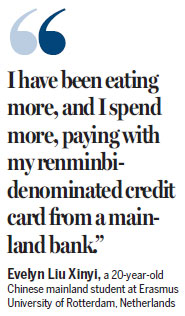Falling euro good news for foreign students
Updated: 2015-02-14 09:18
By Wiki Su for China Daily(HK Edition)
|
|||||||||
|
Foreign students on the European continent are set to benefit as the euro will extend its slide due to the European Central Bank's quantitative easing measures. Chris Ratcliffe / Bloomberg |
Evelyn Liu Xinyi, a 20-year-old from Liaoning province, arrived in 2014 at Erasmus University of Rotterdam, Netherlands, to study for a degree in Economics.
Since then, she has constantly fielded questions, either from peers or their parents, on how it feels studying in Europe compared with her past experience in Hong Kong.
Overseas students in Europe are probably enjoying the best-ever sweetener from the low exchange rate of the euro against most other major world currencies, including the renminbi.
Liu went to study at Erasmus, one of the world's top universities as ranked by Times Higher Education, after spending two years at Hong Kong Baptist University (HKBU).
"Studying in Europe is quite expensive, but not really as expensive as I originally thought, especially now that the euro has depreciated so much," said Liu, when comparing costs in Europe with Hong Kong and the Chinese mainland.
"Tuition is cheaper than in Hong Kong, while living costs are higher," she said.
Tuition fees at Erasmus come to 6,900 euros ($7,794) a year, or roughly 48,600 yuan. Liu paid her first year's tuition fee on August, but for the second year, she was able to save about 7,000 yuan ($1,121) as the euro continued to slide during the previous months.
Liu's annual tuition fee at HKBU was HK$100,000, or about 80,000 yuan, which is 65 percent higher than that charged by the Dutch university.
But in fact, HKBU has a comparatively lower tuition fee among the eight universities in Hong Kong. Hong Kong University, the city's most prestigious institution, charges mainland students a monthly tuition fee of HK$14,600, nearly twice that in the Netherlands.
However, living costs in Hong Kong are much lower than Rotterdam.

For example, a sandwich and a juice would cost about 5 euros in Rotterdam, while in Hong Kong, they would cost about the equivalent of 2 euros.
"My quality of life has improved since the forex (foreign exchange) changes. I have been eating more, and I spend more, paying with my renminbi-denominated credit card from a mainland bank," she said.
Liu traveled to Paris and Amsterdam during the recent Christmas holidays. "I comforted myself with the knowledge that I was getting a 30 percent discount on anything I bought because of the depreciating euro," she said.
Over in the German city of Karlsruhe, Flora Huang Wenjie, a 24-year-old postgraduate student at the Karlsruhe Institute of Technology, said she did not have to pay tuition fees to study there.
As of October, Germany has abolished tuition fees for both domestic and foreign students.
"I think the macroeconomics environment in Europe does have an impact on me. European governments have tried various measures to stimulate consumption. In the city where I live, all department stores offer discounts all year round," Huang said.
However, not everywhere in Europe is as kind to foreign students as Germany and the Netherlands. Students in countries that use the euro are mostly the ones that benefit.
Ruby Zhao Qiyue, who studies at Cambridge University in the UK, said exchange rate gains were offset by the rise in tuition fees, and she was unable to gain from forex fluctuations between the British pound and renminbi the past three years. Monthly tuition fees at Cambridge totaled the equivalent of 14,511 pounds ($22,340) in 2012, but have now touched nearly 16,000 pounds.
(HK Edition 02/14/2015 page7)
